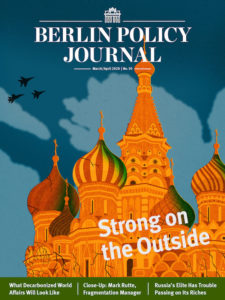 Democracies can reset themselves by changing governments through elections. Modern Russia cannot, says Alexander Baunov, a Senior Fellow at the Carnegie Moscow Center and Editor in Chief of Carnegie.ru. By the confluence of events, Vladimir Putin has made his domestic political future contingent on unpredictable factors: the worldwide pandemic and the world economic recovery, he writes for Foreign Affairs:
Democracies can reset themselves by changing governments through elections. Modern Russia cannot, says Alexander Baunov, a Senior Fellow at the Carnegie Moscow Center and Editor in Chief of Carnegie.ru. By the confluence of events, Vladimir Putin has made his domestic political future contingent on unpredictable factors: the worldwide pandemic and the world economic recovery, he writes for Foreign Affairs:
Vladimir Putin’s supporters can hardly claim that Russia furnishes an example of the benefits of the authoritarian model in a crisis. Rather, Russia briefly rose to number two in the world in cases (it ceded this place to Brazil just a few days ago) and has manifested a conspicuous absence of decisive central leadership. By the official numbers, even Ukraine—long Russia’s official example of a corrupt and dysfunctional democracy and a boogeyman for those who fear regime change—has done better than Russia in containing the pandemic’s spread.
 Join NDI’s Director of Electoral Programs Pat Merloe for a discussion with National Endowment for Democracy (NED) board member Representative Karen Bass about how global leaders can build trust and practice good governance during #COVID19. Listen to the latest #DemWorks podcast here.
Join NDI’s Director of Electoral Programs Pat Merloe for a discussion with National Endowment for Democracy (NED) board member Representative Karen Bass about how global leaders can build trust and practice good governance during #COVID19. Listen to the latest #DemWorks podcast here.
Turkey and Russia are often portrayed as two authoritarian regimes led by strong leaders who favour an omnipotent state at the expense of fundamental freedoms and liberal democratic institutions, note analysts Dimitar Bechev and Suat Kınıklıoğlu. Yet, putting these two countries into the same basket and formulating policies accordingly is problematic.
 That said, Turkey is quickly approaching a critical crossroad on its turbulent political journey: The country will either consolidate its authoritarian regime or return to democracy. The EU has a high stake in this matter, and thus it needs to take a proactive stance in favour of pro-democracy forces, they write for the German Institute for International and Security Affairs:
That said, Turkey is quickly approaching a critical crossroad on its turbulent political journey: The country will either consolidate its authoritarian regime or return to democracy. The EU has a high stake in this matter, and thus it needs to take a proactive stance in favour of pro-democracy forces, they write for the German Institute for International and Security Affairs:
Although Russia will remain authoritarian for some time to come, Turkey is approaching a historic crossroad: Either authoritarianism will be consolidated or some sort of return to parliamentary democracy will prevail. Hence, the EU should strongly support pro-democracy forces in Turkey by increasing its support for civil society, intellectuals, and the remaining independent media. The Union should continue to make critical issues such as the customs union upgrade, visa liberalisation, and financial support for Syrian refugees conditional on concrete steps towards democratisation.
European decision-makers must look beyond the nativist populism of Erdoğan and recognise that a considerable part of the country no longer supports an executive presidency, but rather prefers a return to parliamentary democracy, they conclude.







